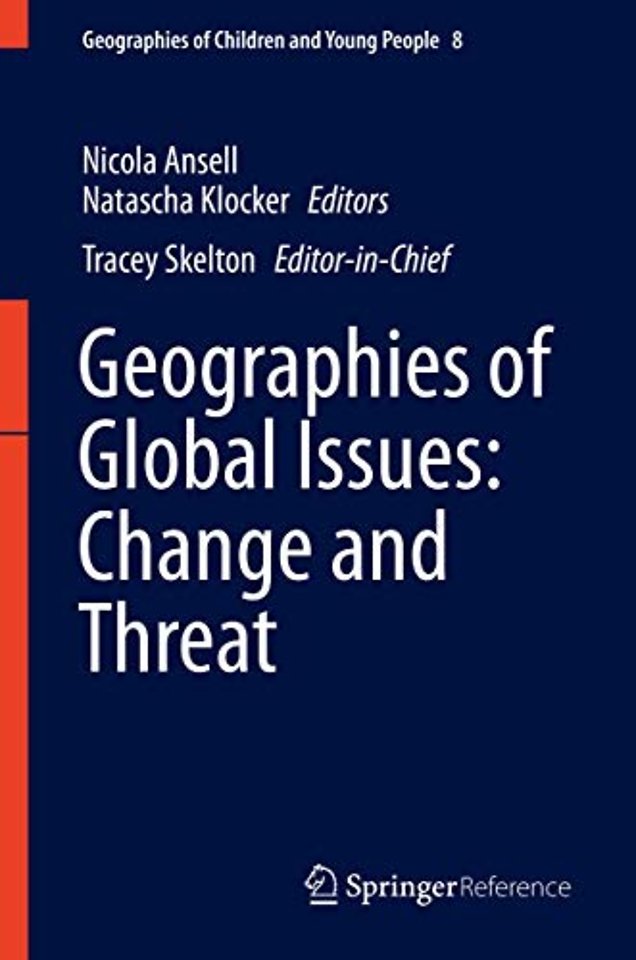Geographies of Global Issues: Change and Threat
Gebonden Engels 2016 9789814585538Samenvatting
Volume 8 explores children and young people’s lives at a time of rapid and profound change, through the lens of diverse global processes: economic globalisation, environmental degradation, international development, cultural change, climate change and environmental hazards. Today’s children and young people are growing up in a world that is rapidly changing and very different to that experienced by previous generations. Contemporary social, economic and environmental challenges make children and young people vulnerable and expose them to harm. Equally, they compel them to become instigators of change across geographical scales, from the household to the globe. Children and young people need to be adaptive and resourceful: economically, socially and emotionally.
This volume is divided into two substantive sections. Chapters in the first section explore global economic changes and instabilities that are altering patterns of work, compelling children to take on new economic responsibilities and reshaping childcare arrangements. Several chapters address the ways in which global processes shape young people’s subjectivities, with media, internet and education encouraging children and youth to view themselves as both entrepreneurs and global citizens. Other chapters consider the policies and development interventions implemented by global organisations and national governments. These can have unintended consequences because they are rooted in a normative discourse of a ‘global child’ that bears little relation to lived realities.
Chapters in the second section foreground children and young people’s contributions to environmental issues and debates. Children and young people are affected by environmental change: by pollution, environmental hazards and climate change. They suffer displacement, ill-health and anxiety about the future. They are also intimately attached to – and knowledgeable about – their local environments. Children and young people actively shape their environments, yet their lives remain powerfully influenced by today’s decision-makers. The window of opportunity to avoid catastrophic climate change is small. Evidence of children and young people’s environmental knowledge and activism does not obviate the need for adults to take decisive action, now, to ensure a viable environment for future generations.
Specificaties
Lezersrecensies
Inhoudsopgave
<p>1 Political economy of children’s work: economic restructuring, the coffee trade and social reproduction in post-Socialist Ethiopia</p>
<p>2 College Entrepreneurs in India: The Fortune at the Bottom of a Pyramid Scheme</p>
<p>3 Youth Entrepreneurship and Socioeconomic Change in Urban Ghana</p>
4 Mega-Sporting Events, Rights and Children’s Everyday Lives: Exploring the Impact of the Brazil 2014 FIFA World Cup<p></p>
<p>5 Childcare Arrangements of Burmese Migrant Workers in Thailand</p>
<p>6 Migrant Domestic Workers and the Globalization of Childcare</p>
<p>SECTION 2: ENVIRONMENTAL KNOWLEDGE, CHANGE AND ISSUES <br></p><p></p>
<p>14 Child Health and Survival in a Changing Climate: Vulnerability, Mitigation, and Adaptation</p>
15 Children, Young People and Climate Change: A Gender Perspective<p></p>
<p>16 Young People and Global Climate Change: Emotions, Coping, and Engagement in Everyday Life</p>
<p><br></p>
Rubrieken
- advisering
- algemeen management
- coaching en trainen
- communicatie en media
- economie
- financieel management
- inkoop en logistiek
- internet en social media
- it-management / ict
- juridisch
- leiderschap
- marketing
- mens en maatschappij
- non-profit
- ondernemen
- organisatiekunde
- personal finance
- personeelsmanagement
- persoonlijke effectiviteit
- projectmanagement
- psychologie
- reclame en verkoop
- strategisch management
- verandermanagement
- werk en loopbaan

